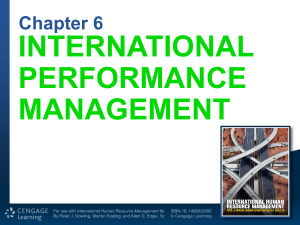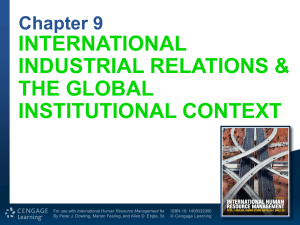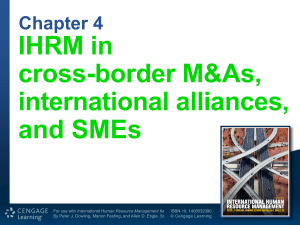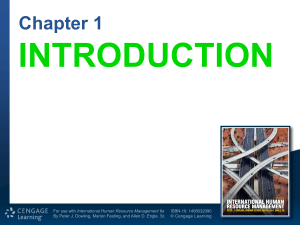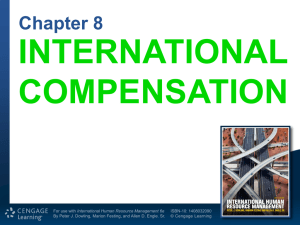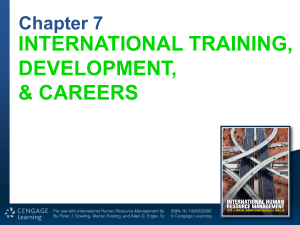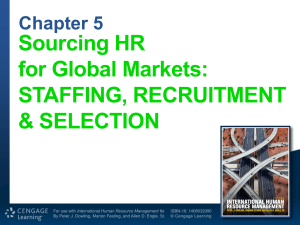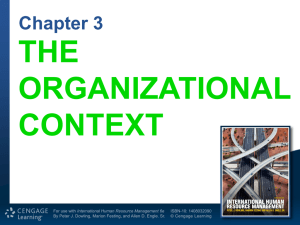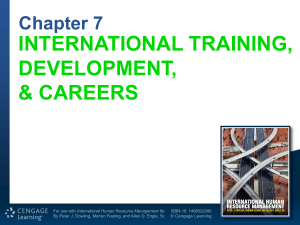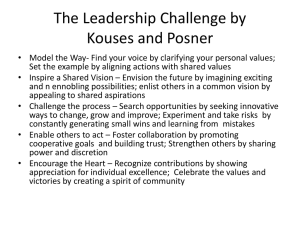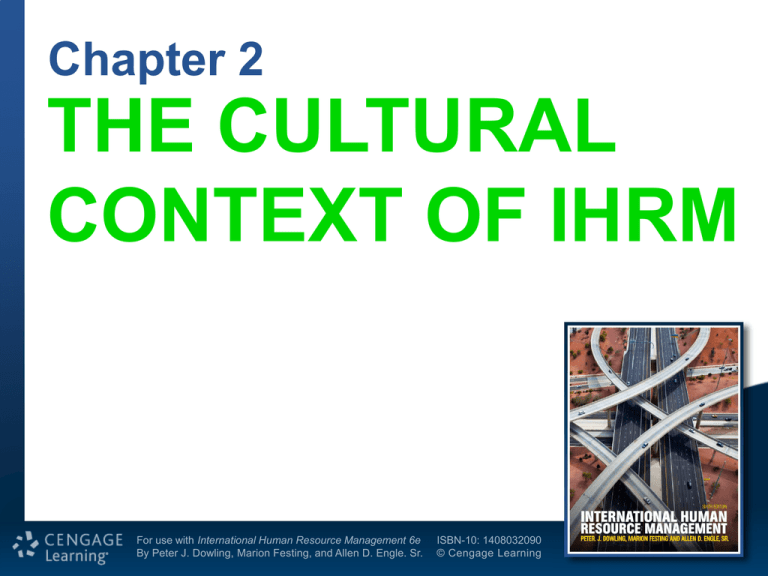
Chapter 2
For use with International Human Resource Management 6e
By Peter J. Dowling, Marion Festing, and Allen D. Engle. Sr.
ISBN-10: 1408032090
© Cengage Learning
1 of 27
Chapter 2
THE CULTURAL
CONTEXT OF IHRM
START
Chapter 2
Click on an item to
go to its section.
THE CULTURAL
CONTEXT OF IHRM
Vocabulary
Objectives
Definitions of culture
Intro to cross-cultural management research
The Hofstede study
The GLOBE study
The Trompenaars & Hampden-Turner study
Hall & Hall’s cultural dimensions
The development of cultures
For use with International Human Resource Management 6e
By Peter J. Dowling, Marion Festing, and Allen D. Engle. Sr.
ISBN-10: 1408032090
© Cengage Learning
2 of 27
Chapter 2
Click on the book
cover below to
return to this table
of contents.
Vocabulary
Culture as defined by: Kluckhohn & Kroeber, Hansen, Schein
artefacts, values, underlying assumptions
cross-cultural management
Hofstede:
power distance, uncertainty avoidance, femininity vs. masculinity,
individualism vs. collectivism, long-term orientation
Confucianism, Confucianism dynamics
GLOBE:
ingroup, in-group collectivism vs. institutional collectivism
organizational culture, national culture, gender egalitarianism,
assertiveness, performance orientation, humane orientation
Trompenaars, & Hampden-Turner:
universalism vs. particularism, communitarianism, neutral vs.
emotional, diffuse vs. specific, ascriptive vs. achievement,
sequential vs. synchronic time, internal vs. external control
Hall & Hall:
high vs. low context, spatial orientation,
polychrome vs. monochrome time
For use with International Human Resource Management 6e
By Peter J. Dowling, Marion Festing, and Allen D. Engle. Sr.
ISBN-10: 1408032090
© Cengage Learning
3 of 27
Chapter 2
Objectives
Learn these key findings and themes:
1. Definitions of culture
2. Cultural concepts
3. Results of various intercultural mgmt. studies:
Hofstede, GLOBE, Trompenaars, & others
4. Reflections on cross-cultural mgmt. research
For use with International Human Resource Management 6e
By Peter J. Dowling, Marion Festing, and Allen D. Engle. Sr.
ISBN-10: 1408032090
© Cengage Learning
4 of 27
Chapter 2
5. Development of cultures
For use with International Human Resource Management 6e
By Peter J. Dowling, Marion Festing, and Allen D. Engle. Sr.
ISBN-10: 1408032090
© Cengage Learning
5 of 27
Chapter 2
Definitions of culture
Kluckhohn & Kroeber def. of culture
Culture consists in patterned ways of
Thinking
Feeling
Reacting
acquired & transmitted mainly by symbols,
constituting the distinctive achievements of human groups,
including their embodiments in artefacts;
consists of
traditional ideas &
their attached values
For use with International Human Resource Management 6e
By Peter J. Dowling, Marion Festing, and Allen D. Engle. Sr.
ISBN-10: 1408032090
© Cengage Learning
6 of 27
Chapter 2
The
essential
core of
culture
Hansen’s 4 elements of culture:
1. Communication
2. Thought
3. Feeling
4. Behavior
For use with International Human Resource Management 6e
By Peter J. Dowling, Marion Festing, and Allen D. Engle. Sr.
ISBN-10: 1408032090
© Cengage Learning
7 of 27
Chapter 2
Standardization of
Schein’s concept of culture
A culture has 3 levels:
For use with International Human Resource Management 6e
By Peter J. Dowling, Marion Festing, and Allen D. Engle. Sr.
ISBN-10: 1408032090
© Cengage Learning
8 of 27
Chapter 2
1. Artefacts - visible
2. Values – intermediate level of consciousness
3. Underlying assumptions – invisible,
unconscious
Schein’s 6 underlying assumptions
Nature of reality & truth
Time dimension
Effect of spatial proximity & distance
Nature of being human
Type of human activity
Nature of human relationships
For use with International Human Resource Management 6e
By Peter J. Dowling, Marion Festing, and Allen D. Engle. Sr.
ISBN-10: 1408032090
© Cengage Learning
9 of 27
Chapter 2
1.
2.
3.
4.
5.
6.
For use with International Human Resource Management 6e
By Peter J. Dowling, Marion Festing, and Allen D. Engle. Sr.
ISBN-10: 1408032090
© Cengage Learning
10 of 27
Chapter 2
Intro to cross-cultural mgmt. research
Goals of cross-cultural mgmt. studies
Describe
Compare
organizational behavior
between countries & cultures
For use with International Human Resource Management 6e
By Peter J. Dowling, Marion Festing, and Allen D. Engle. Sr.
ISBN-10: 1408032090
© Cengage Learning
11 of 27
Chapter 2
Explain & improve interaction between
employees, customers, suppliers or
business in different countries & cultures
For use with International Human Resource Management 6e
By Peter J. Dowling, Marion Festing, and Allen D. Engle. Sr.
ISBN-10: 1408032090
© Cengage Learning
12 of 27
Chapter 2
The Hofstede study
Hofstede’s 5 culture dimensions
Power distance
Uncertainty avoidance
Femininity vs. masculinity
Individualism vs. collectivism
Confucianism or long-term orientation
For use with International Human Resource Management 6e
By Peter J. Dowling, Marion Festing, and Allen D. Engle. Sr.
ISBN-10: 1408032090
© Cengage Learning
13 of 27
Chapter 2
1.
2.
3.
4.
5.
Long-term cultures characterized by:
Great endurance, persistence in pursuing goals
Position of ranking based on status
Adaptation of traditions to modern conditions
Respect of social & status obligations within limits
High savings rates & high investment activity
Readiness to subordinate oneself to a purpose
For use with International Human Resource Management 6e
By Peter J. Dowling, Marion Festing, and Allen D. Engle. Sr.
ISBN-10: 1408032090
© Cengage Learning
14 of 27
Chapter 2
The feeling of shame
Short-term cultures characterized by:
For use with International Human Resource Management 6e
By Peter J. Dowling, Marion Festing, and Allen D. Engle. Sr.
ISBN-10: 1408032090
© Cengage Learning
15 of 27
Chapter 2
Personal candor & stability
Avoiding loss of face
Respect of social & status obligations without
consideration of costs
Low savings rates & low investment activity
Expectations of quick profit
Respect for traditions
Greetings, presents & courtesies based on
reciprocity
For use with International Human Resource Management 6e
By Peter J. Dowling, Marion Festing, and Allen D. Engle. Sr.
ISBN-10: 1408032090
© Cengage Learning
16 of 27
Chapter 2
Figure 2.1
Hofstede study: Power distance & individualism vs. collectivism
For use with International Human Resource Management 6e
By Peter J. Dowling, Marion Festing, and Allen D. Engle. Sr.
ISBN-10: 1408032090
© Cengage Learning
17 of 27
Chapter 2
Table 2.1
Impact of the cultural context on HRM practices
Future Hofstede-style research issues
Realization of cross-level studies
Consider groups, organizations, & country levels
Inclusion of cross-cultural differences
Consider intracultural variance
Inclusion of theoretically relevant moderators
Consider sex, class affiliation, etc.
For use with International Human Resource Management 6e
By Peter J. Dowling, Marion Festing, and Allen D. Engle. Sr.
ISBN-10: 1408032090
© Cengage Learning
18 of 27
Chapter 2
Interaction between variables
For use with International Human Resource Management 6e
By Peter J. Dowling, Marion Festing, and Allen D. Engle. Sr.
ISBN-10: 1408032090
© Cengage Learning
19 of 27
Chapter 2
The GLOBE study
Are there leadership behaviors, attributes & org. practices
effective across all cultures?
Are there leadership behaviors, attributes & org. practices
effective in some cultures only?
How much do leadership attributes affect the effectiveness
of specific leadership behavior & its acceptance by
subordinates?
How much do behaviors & attributes in specific cultures
influence the well-being of members in the researched
societies?
What is the relationship between these socio-cultural
variables & an international competitive capacity
of the various sample societies?
For use with International Human Resource Management 6e
By Peter J. Dowling, Marion Festing, and Allen D. Engle. Sr.
ISBN-10: 1408032090
© Cengage Learning
20 of 27
Chapter 2
The GLOBE study questions
GLOBE’s 8 culture dimensions
Institutional collectivism
In-group collectivism
Uncertainty avoidance
Power distance
Gender egalitarianism
Assertiveness
Performance orientation
Humane orientation
For use with International Human Resource Management 6e
By Peter J. Dowling, Marion Festing, and Allen D. Engle. Sr.
ISBN-10: 1408032090
© Cengage Learning
21 of 27
Chapter 2
1.
2.
3.
4.
5.
6.
7.
8.
For use with International Human Resource Management 6e
By Peter J. Dowling, Marion Festing, and Allen D. Engle. Sr.
ISBN-10: 1408032090
© Cengage Learning
22 of 27
Chapter 2
The Trompenaars & Hampden-Turner study
a
Relationships
between
people
1. Universalism vs. particularism
2. Individualism vs.
communitarianism
3. Emotional vs. neutral
4. Specific vs. diffuse
5. Ascription vs. achievement
Concept of time
6. Sequential vs. synchronic
concept of time
Concept of nature
7. Internal vs. external control
For use with International Human Resource Management 6e
By Peter J. Dowling, Marion Festing, and Allen D. Engle. Sr.
ISBN-10: 1408032090
© Cengage Learning
23 of 27
Chapter 2
7 dimensions of Trompenaars & H-T study
For use with International Human Resource Management 6e
By Peter J. Dowling, Marion Festing, and Allen D. Engle. Sr.
ISBN-10: 1408032090
© Cengage Learning
24 of 27
Chapter 2
Hall & Hall’s cultural dimensions
Hall & Hall’s 4 dimensions
1. High vs. low context communication
2. Spatial orientation
actual distance between people when communicating
3. Monochrome vs. polychrome time
sequential processes vs. parallel actions
4. Information speed
For use with International Human Resource Management 6e
By Peter J. Dowling, Marion Festing, and Allen D. Engle. Sr.
ISBN-10: 1408032090
© Cengage Learning
25 of 27
Chapter 2
high or low information flow during communication
For use with International Human Resource Management 6e
By Peter J. Dowling, Marion Festing, and Allen D. Engle. Sr.
ISBN-10: 1408032090
© Cengage Learning
26 of 27
Chapter 2
The development of cultures
Cultures change
There is increasing
1. International connectedness
2. Global economy coordination
3. Harmonization of laws & regulations
4. Migration
How resistant are cultures to change?
Generation Y are fast, self-organized & absorbed learners
with distinct work-life balance preferences
Entire society workforces are aging
For use with International Human Resource Management 6e
By Peter J. Dowling, Marion Festing, and Allen D. Engle. Sr.
ISBN-10: 1408032090
© Cengage Learning
27 of 27
Chapter 2
Cultures are not confined to given territories.
This means new challenges for HRM.

